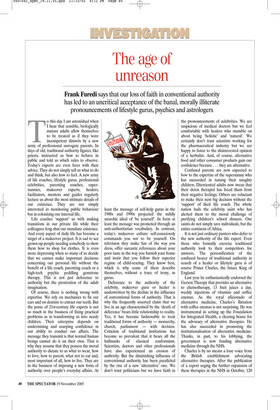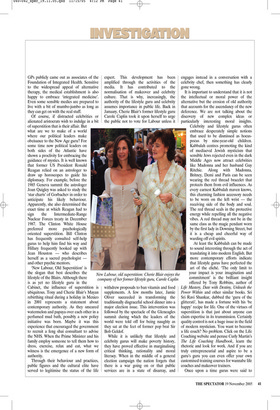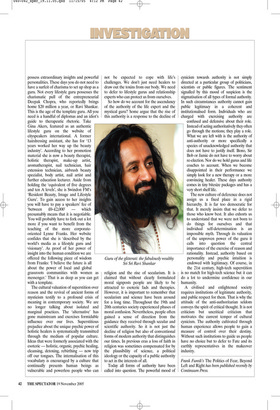The age of unreason
Frank Furedi says that our loss of faith in conventional authority has led to an uncritical acceptance of the banal, morally illiterate pronouncements of lifestyle gurus, psychics and astrologers
To this day I am astonished when I hear that sensible, biologically mature adults allow themselves to be treated as if they were incompetent dimwits by a new army of professional surrogate parents. In days of old, traditional authority figures, like priests, instructed us how to behave in public and told us which rules to observe. Today’s experts are even freer with their advice. They do not simply tell us what to do and think, but also how to feel. A new army of life coaches, lifestyle gurus, professional celebrities, parenting coaches, supernannies, makeover experts, healers, facilitators, mentors and guides regularly lecture us about the most intimate details of our existence. They are not simply interested in monitoring public behaviour but in colonising our internal life.
Life coaches ‘support’ us with making transitions in our private life while their colleagues feng shui our mundane existence. And every aspect of daily life has become a target of a makeover project. It is sad to see grown-up people needing somebody to show them how to shop for clothes. It is even more depressing when so many of us decide that we cannot make important decisions concerning our personal life without the benefit of a life coach, parenting coach or a high-tech psychic peddling gemstone therapy. This is not just deference to authority but the prostration of the adult imagination.
Of course, there is nothing wrong with expertise. We rely on mechanics to fix our cars and on dentists to extract our teeth. But the posse of 21st-century life experts is not so much in the business of fixing practical problems as in transforming us into needy children. Their enterprise depends on undermining and usurping confidence in our ability to conduct our affairs. The message they transmit is that normal human beings cannot do it on their own. That is why they assume that they possess the moral authority to dictate to us what to wear, how to love, how to parent, what not to eat and, most important of all, how to live. They are in the business of imposing a new form of authority over people’s everyday affairs. At least the message of self-help gurus in the 1980s and 1990s projected the mildly anarchic ideal of ‘be yourself’. In form at least the message was promoted through an anti-authoritarian vocabulary. In contrast, today’s makeover culture self-consciously commands you not to be yourself. On television they make fun of the way you dress, offer sarcastic references about your poor taste in the way you furnish your home and insist that you follow their superior regime of child-rearing. They know best, which is why some of them describe themselves, without a trace of irony, as gurus.
Deference to the authority of the celebrity, makeover guru or healer is underwritten by the decline in the influence of conventional forms of authority. That is why the frequently asserted claim that we live in an age characterised by the ‘death of deference’ bears little relationship to reality. Yes, it has become fashionable to treat traditional forms of authority — monarchy, church, parliament — with derision. Criticism of traditional institutions has become so prevalent that it bears all the hallmarks of classical conformism. Scientists, doctors and other professionals have also experienced an erosion of authority. But the diminishing influence of conventional authority has been paralleled by the rise of a new ‘alternative’ one. We don’t trust politicians but we have faith in the pronouncements of celebrities. We are suspicious of medical doctors but we feel comfortable with healers who mumble on about being ‘holistic’ and ‘natural’. We certainly don’t trust scientists working for the pharmaceutical industry but we are happy to listen to the disinterested opinion of a herbalist. And, of course, alternative food and other consumer products gain our confidence because ... they are alternative.
Confused parents are now expected to bow to the expertise of the supernanny who has succeeded in taming their naughty children. Disoriented adults now swear that their detox therapist has freed them from their negative feelings. Others are reluctant to make their next big decision without the ‘support’ of their life coach. The whole nation hails the celebrity saint who has alerted them to the moral challenge of purifying children’s school dinners. Our saints do not simply save individuals, but the entire continent of Africa.
It is not just ordinary punters who defer to the new authority of the life expert. Even those who formally exercise traditional authority look to their competitors for answers. The personification of the confused bearer of traditional authority in search of a healer or lifestyle guru is of course Prince Charles, the future King of England.
Last year he enthusiastically endorsed the Gerson Therapy that provides an alternative to chemotherapy, 13 fruit juices a day, weekly injections of vitamins and coffee enemas. As the royal aficionado of alternative medicine, Charles’s flirtation with coffee enemas is not surprising. He was instrumental in setting up the Foundation for Integrated Health, a clearing house for the advocacy of alternative therapies. He has also succeeded in promoting the institutionalisation of alternative medicine. Thanks, in part, to his lobbying, the government is now funding alternative medicine through the NHS.
Charles is by no means a lone voice from the British establishment advocating alternative therapies. After the publication of a report urging the further expansion of these therapies in the NHS in October, 120 GPs publicly came out as associates of the Foundation of Integrated Health. Sensitive to the widespread appeal of alternative therapy, the medical establishment is also happy to embrace ‘integrated medicine’. Even some sensible medics are prepared to live with a bit of mumbo-jumbo as long as they can get on with the real stuff.
Of course, if distracted celebrities or alienated aristocrats wish to indulge in a bit of superstition that is their affair. But what are we to make of a world where our political leaders make obeisance to the New Age guru? For some time now political leaders on both sides of the Atlantic have shown a proclivity for embracing the guidance of mystics. It is well known that former US President Ronald Reagan relied on an astrologer to draw up horoscopes to guide his diplomacy. For example, before the 1985 Geneva summit the astrologer Joan Quigley was asked to study the ‘star charts’ of Gorbachev in order to anticipate his likely behaviour. Apparently, she also determined the exact time at which Reagan had to sign the Intermediate-Range Nuclear Forces treaty in December 1987. The Clinton White House preferred more psychologically oriented superstition. Bill Clinton has frequently consulted self-help gurus to help him find his way and Hillary frequently hooked up with Jean Houston — who describes herself as a sacred psychologist and other psychic mentors.
‘New Labour, Old Superstition’ is the slogan that best describes the lifestyle of the Blairs. Although there is as yet no lifestyle guru in the Cabinet, the influence of superstition is ubiquitous. Tony and Cherie Blair’s Mayan rebirthing ritual during a holiday in Mexico in 2001 represents a statement about contemporary authority. As they smeared watermelon and papaya over each other in a perfumed mud bath, possibly a new policy initiative was born. Maybe it was this experience that encouraged the government to recruit a feng shui consultant to advise the NHS. When the Prime Minister and his family employ someone to tell them how to dress, exercise, relax and eat, what we witness is the emergence of a new form of authority.
Through their behaviour and practices, public figures and the cultural elite have served to legitimise the status of the life expert. This development has been amplified through the activities of the media. It has contributed to the normalisation of makeover and celebrity culture. That is why, increasingly, the authority of the lifestyle guru and celebrity assumes importance in public life. Back in January, Cherie Blair’s former lifestyle guru Carole Caplin took it upon herself to urge the public not to vote for Labour unless it withdrew proposals to ban vitamin and food supplements. A few months later, Jamie Oliver succeeded in transforming the traditionally disgraceful school dinner into a major election issue. This intervention was followed by the spectacle of the Gleneagles summit during which the leaders of the world were told off for being naughty as they sat at the feet of former pop brat Sir Bob Geldof.
While it is unlikely that lifestyle and celebrity gurus will make poverty history, they have proved effective in marginalising critical thinking, rationality and moral literacy. When in the middle of a general election campaign the nation forgets that there is a war going on or that public services are in a state of disarray, and engages instead in a conversation with a celebrity chef, then something has clearly gone wrong.
It is important to understand that it is not the intellectual or moral power of the alternative but the erosion of old authority that accounts for the ascendancy of the new deference. We are not talking about the discovery of new complex ideas or particularly interesting moral insights. Celebrity and lifestyle gurus often embrace desperately simple notions that used to be dismissed as hocuspocus by nine-year-old children. Kabbalah centres promoting the kind of mediaeval Jewish mysticism that sensible Jews rejected even in the dark Middle Ages now attract celebrities like Madonna and her husband Guy Ritchie. Along with Madonna, Britney, Demi and Paris can be seen wearing the red thread bracelet that protects them from evil influences. As every earnest Kabbalah maven knows, this charming fashion accessory needs to be worn on the left wrist — the receiving side of the body and soul. The red thread seals in the protective energy while repelling all the negative vibes. A red thread may not be in the same class as the magic pendant worn by the first lady in Downing Street, but it is a cheap and cheerful way of warding off evil spirits.
At least the Kabbalah can be made to sound interesting through the act of translating it into modern English. But more contemporary efforts indicate that lifestyle gurus have perfected the art of the cliché. ‘The only limit to your impact is your imagination and commitment’ is the brilliant insight offered by Tony Robbins, author of Life Mastery, Date with Destiny, Unleash the Power Within and other similar books. Sri Sri Ravi Shankar, dubbed the ‘guru of the glitterati’, has made a fortune with his ‘be happy’ recipe for life. One of the virtues of superstition is that just about anyone can claim expertise in its transmission. Certainly quality control is not a huge issue in the field of modern mysticism. You want to become a life coach? No problem. Click on the Life Coaching website and peruse Curly Martin’s The Life Coaching Handbook, learn the rhetoric and look for work. And if you are truly entrepreneurial and aspire to be a guru’s guru you can even offer your own customised training courses for wannabe life coaches and makeover trainers.
Once upon a time gurus were said to possess extraordinary insights and powerful personalities. These days you do not need to have a surfeit of charisma to set up shop as a guru. Not every lifestyle guru possesses the charismatic pull of the entrepreneurial Deepak Chopra, who reportedly brings home $20 million a year, or Ravi Shankar. This is the age of the template guru. All you need is a handful of diplomas and an idiot’s guide to therapeutic rhetoric. Take Gina Akers, featured as an authentic lifestyle guru on the website of cityspeakers international. A former hairdressing assistant, she has for ‘13 years worked her way up the beauty industry’. According to her promotion material she is now a beauty therapist, holistic therapist, make-up artist, aromatherapist, nail technician, hair extension technician, airbrush beauty specialist, body artist, nail artist and further education lecturer. Aside from holding the ‘equivalent of five degrees and ten A levels’, she is Swindon FM’s ‘Resident Beauty, Image and Lifestyle Guru’. To gain access to her insights you will have to pay a speakers’ fee of ‘between £0–£2,000’ — which presumably means that it is negotiable. You will probably have to fork out a lot more if you want to benefit from the teaching of the more corporateoriented Lynne Franks. Her website confides that she is ‘described by the world’s media as a lifestyle guru and visionary’. As proof of her power of insight into the human condition we are offered the following piece of wisdom from Franks: ‘I believe the future is all about the power of local and global grassroots communities with women as messenger.’ That is as deep as you can get with a template.
The cultural valuation of superstition over reason and the revival of ancient forms of mysticism testify to a profound crisis of meaning in contemporary society. We are no longer talking about isolated and marginal practices. The ‘alternative’ has gone mainstream and exercises formidable influence over our lives. Superstitious prejudice about the unique psychic power of holistic healers is systematically transmitted through the medium of popular culture. Ideas that were formerly associated with the esoteric — holistic, organic, psychic healing, cleansing, detoxing, rebirthing — now trip off our tongues. The internalisation of this vocabulary is encouraged by a culture that continually presents human beings as vulnerable and powerless people who can not be expected to cope with life’s challenges. We don’t just need healers to draw out the toxins from our body. We need to defer to lifestyle gurus and relationship experts who can protect us from ourselves.
So how do we account for the ascendancy of the authority of the life expert and the mystical guru? Some argue that the rise of this authority is a response to the decline of religion and the rise of secularism. It is claimed that without clearly formulated moral signposts people are likely to be attracted to esoteric fads and therapies. However, it is important to remember that secularism and science have been around for a long time. Throughout the 19th and 20th centuries society experienced phases of moral confusion. Nevertheless, people often gained a sense of direction from the guidance they received through secular and scientific authority. So it is not just the decline of religion but also of conventional forms of modern authority that distinguishes our times. In previous eras a loss of faith in religion was sometimes compensated for by the plausibility of science, a political ideology or the capacity of a public authority to act in the interests of all.
Today all forms of authority have been called into question. The powerful mood of cynicism towards authority is not simply directed at a particular group of politicians, scientists or public figures. The sentiment signalled by this mood of suspicion is the stigmatisation of all types of formal authority. In such circumstances authority cannot gain public legitimacy in a coherent and institutionalised form. Individuals who are charged with exercising authority are confused and defensive about their role. Instead of acting authoritatively they often go through the motions; they play a role. What we are left with is the authority of anti-authority or more specifically a species of unacknowledged authority that does not have to justify itself. Bono, Sir Bob or Jamie do not have to worry about re-election. Nor do we hold gurus and life coaches to account. When we become disappointed in their performance we simply look for a new therapy or a more convincing healer. These days authority comes in tiny bitesize packages and has a very short shelf life.
The new culture of deference does not assign us a fixed place in a rigid hierarchy. It is far too democratic for that. It merely insists that we defer to those who know best. It also exhorts us to understand that we were not born to do things for ourselves and that individual self-determination is an impossible myth. Through its valuation of the unproven power of the guru it calls into question the central importance of the exercise of reason and rationality. Instead, authority based on personality and psychic intuition is endowed with legitimacy. Of course, in the 21st century, high-tech superstition is no match for high-tech science but it can do a lot to undermine confidence in our humanity.
A civilised and enlightened society requires institutions of legitimate authority, and public respect for them. That is why the attitude of the anti-authoritarian seldom conveys the spirit of critical thought. It is not criticism but uncritical criticism that motivates the current temper of cultural cynicism. The authority cultivated through human experience allows people to gain a measure of control over their destiny. Without such institutions to guide us people have no choice but to defer to Fate and its earthly representatives in the makeover industry.



























































 Previous page
Previous page